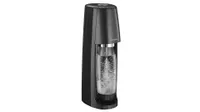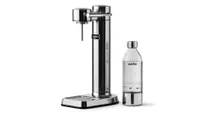I finally tried a SodaStream and it's great but there's an upmarket rival that's even better!
2022 is the year to get busy with the fizzy, courtesy of SodaStream and Aarke

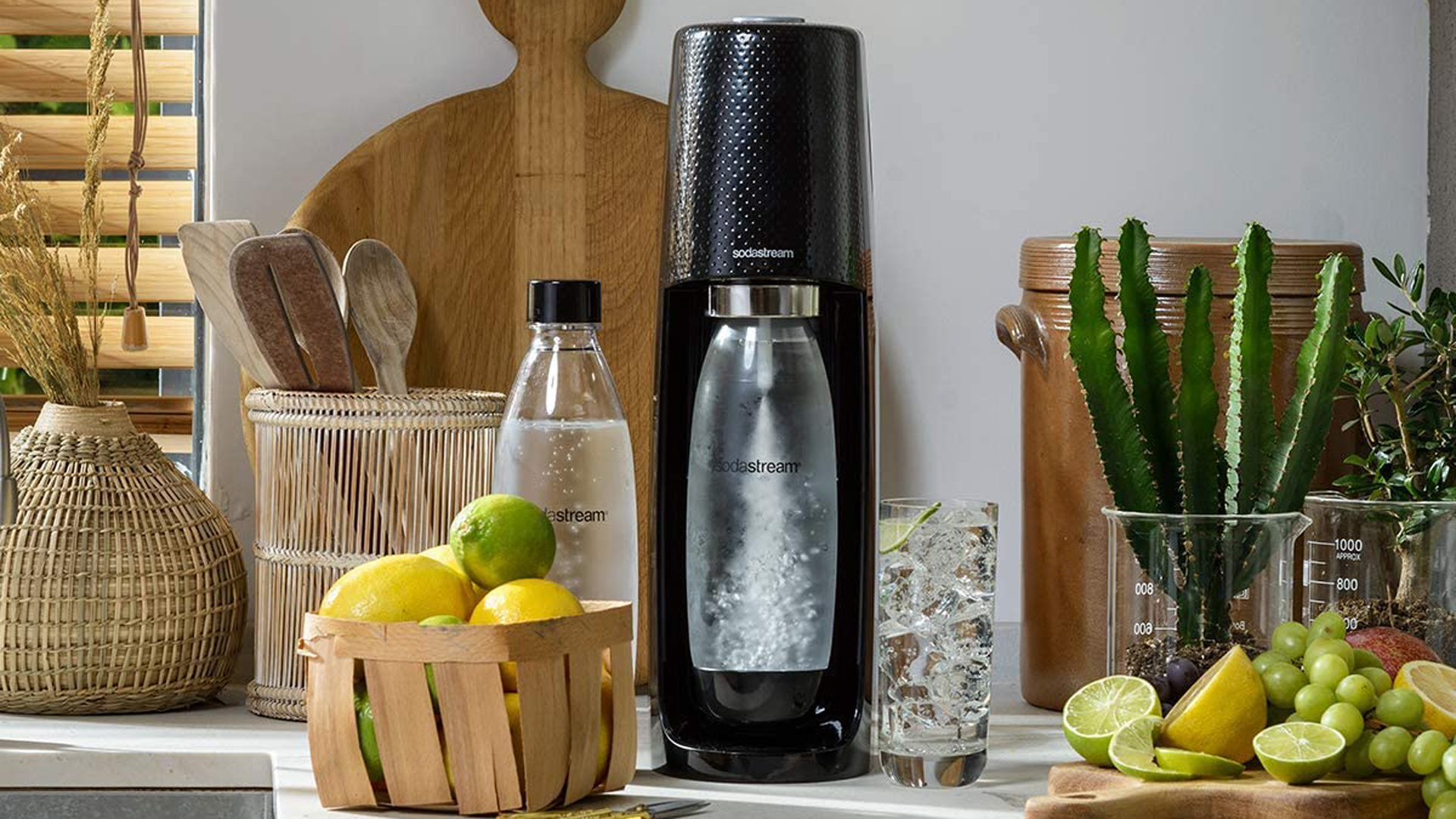
SodaStream, as you probably know, is a device for making your own carbonated drinks, primarily turning tap water into fizzy tap water. It has now been available in one form or another for well over 100 years – they started out marketing 'make your own sasparilla' kits to the royal family and landed gentry in the early 20th century, according to Wikipedia.
However, in the UK the brand will forever be synonymous with the 1970s and 80s, when it flexed the really quite fantastic slogan 'Get busy with the fizzy'. Readers of a certain age will recall seeing both the machines and a huge range of licensed soft drink syrups – Coke, Dr Pepper, 7 UP – the lot – in places like Debenhams and Argos back in the day. This retro appeal is great for their brand awareness but obviously means that SodaStream is still seen as a rather kitsch and cheesey product, in some quarters. And by 'in some quarters' I mean 'by me'.
The truth is though, that SodaStream carried on going strong way past its 80s heyday. AT T3 it became a bit of a running joke that every time the brand acquired a new PR agency in the 00s, it would send out a press release saying 'SodaStream is back! Remember the 80s?! Hilarious, right?' But it never really came back because it never really went away.
SodaStream's emphasis today is on the ecological value of making your own carbonated water or other fizzy drinks and drinking them from a reusable bottle. The amount of waste caused by soft drink and water bottles and cans is really quite unbelievable, and we've all seen what it's doing to our oceans – and, indeed, our high streets. So this is a very laudable aim.
Anyway, recently a brand called Aarke got in touch with a product of its own: the Carbonator.
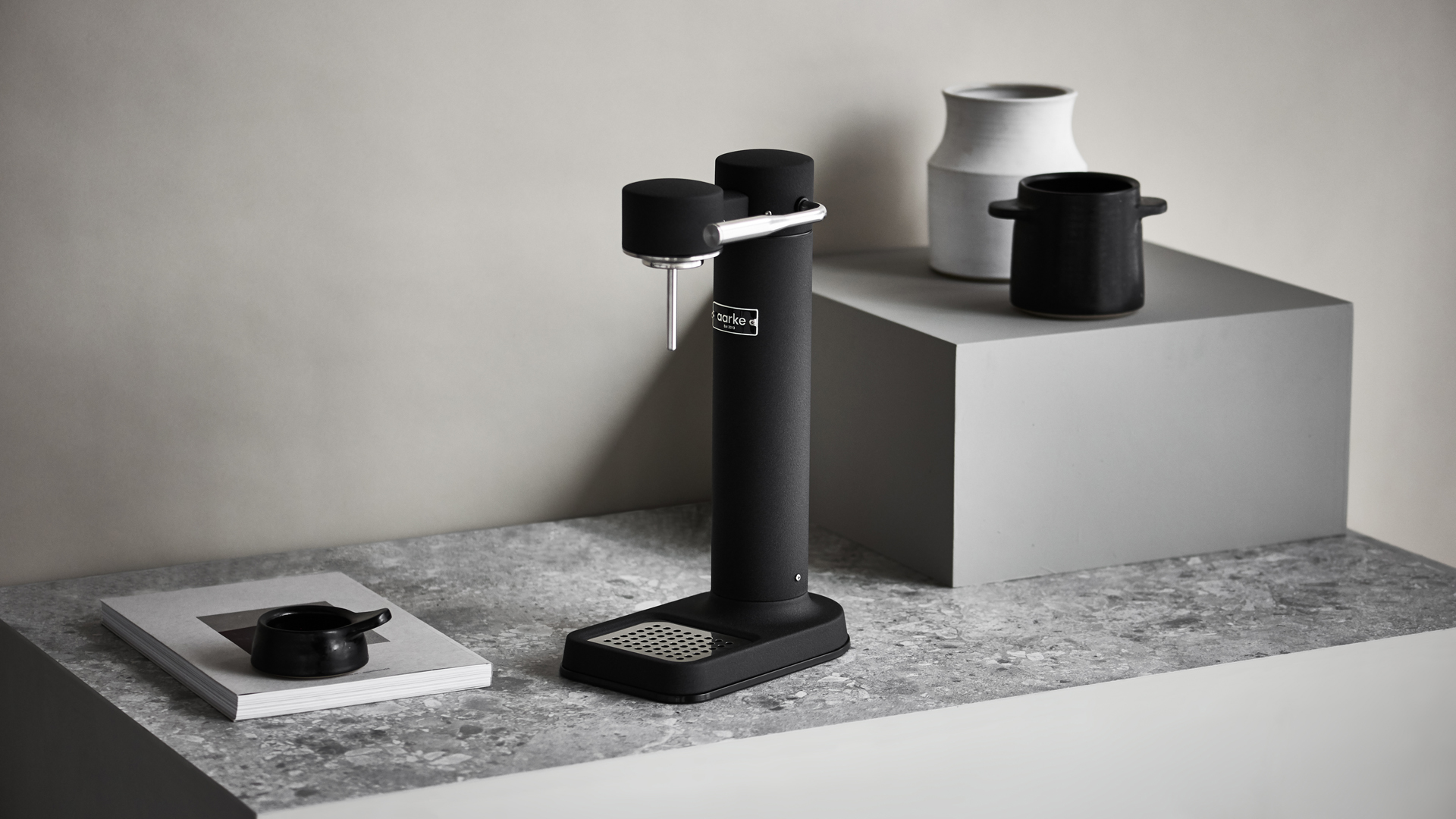
Aarke Carbonator 3: just slightly upmarket of SodaStream, then
As soon as I clapped eyes on this premium device which is designed to be reminiscent of a classic hand pumped espresso machine, and is made in Scandinavia, I thought, 'Upmarket SodaStream'. I was keen to try it, but realised I had never in my whole life tried the original SodaStream. Happily, they were willing to send me one and so now I have tried not one but two different machines for carbonating your drinks.
That's good news for me, as I love getting busy with the fizzy. The good news for you is that both machines are on sale at Amazon today!
SodaStream Spirit was £100, now £69 at Amazon
Well let's face it; SodaStream is practically always on sale at Amazon. Its price has gone as low as £39, around Amazon Prime Day. You can read more about how I got on with it below, but suffice it to say the Spirit is 100% idiot-proof. It comes with 60 litres of gas – enough for 'up to' 60 litres of fizzy drink – and a 1 litre, reusable, BPA-free bottle
Aarke Carbonator 3 was £170, now £138 at Amazon
This is almost twice the price of the SodaStream, doesn't come with a gas canister – that'll be another £23 – and yet it does essentially the same thing as the SodaStream. However, I found it carbonated slightly more efficiently and there is no denying that it looks and feels way nicer, with Scandiwegian good looks, a choice of chic metallic finishes and very substantial build quality.
So what are these fizz machines like to use? There is not a lot to say about them because they each boast one moving part and no electronic elements at all – slightly to my surprise. With the SodaStream, you screw in the included gas canister and are ready to go in about a minute.
You just fill the supplied bottle with water to the line marked on the side, push it onto the fizz-making spike and push it up and inwards to lock in place. I used water from a Brita Style water filter jug but tap is no doubt fine as well. You then push the fizz button on top as many times as you like. SodaStream says to try 3 presses of 2 seconds each for slightly fizzy, 5 presses for more fizzy and then suggests you just carry on pressing it if you want it even fizzier.
The Aarke performs in a very similar way, despite external appearances. I found it a little more fiddly to set up, but not to a terrible degree. The mechanism for attaching your water-filled bottle is also perhaps a little clonkier but fine once you've mastered it. You then pull the lever once, twice or thrice depending on how fizzy you like your water.
This is way more satisfying than pushing the little button atop the SodaStream but on the down side, it makes a decidedly non-premium shrieking sound as the carbonation cycle ends. At least that makes it very clear that it's time to release the lever, but it's a scary sound that is not at all hygge, despite the air of Swedish zen calm that Aarke is going for here.
If you don't mind being shrieked at by gas, the good news is that it's much easier to get really intense carbonation with Aarke's machine than it is with the SodaStream. I think that's because it forms a tighter seal with the top of the bottle, so CO2 doesn't escape. Or it could just be because it injects way more CO2, of course.
You will void your warranty if you try this, and it's hard to clean the carbonating nozzle after doing it, but you can of course turn your hand to carbonating things other than water if you are a risk-taking bad-ass, like I am. I tried a cheap Sauvignon Blanc with the Sodastream and was rewarded with something that didn't taste a million miles away from Cava. I did make a bit of a mess while experimenting to find the right amount of it to use, though.
SodaStream also still makes the soft drink syrups I mentioned at the start. You don't carbonate these directly. Instead, SodaStream instructs you to carbonate water as usual, add the right amount of syrup and then 'give it a shake'. What could possibly go wrong? I tried using the 'correct' amount, a smaller amount and a larger amount. I found I actually preferred the weaker version of Pepsi Max that resulted from cutting the syrup dose. The one with more syrup than recommended was fairly disgusting. The Pepsi Max made with exactly the right amount of syrup was pleasant but I have to say it didn't taste quite like Pepsi Max direct from a can.
Still, like everything about both these machines, it was fun, and probably good for the planet, as long as you use your carbonating machine of choice consistently, and of course, recycle your CO2 canisters after use.
Get all the latest news, reviews, deals and buying guides on gorgeous tech, home and active products from the T3 experts
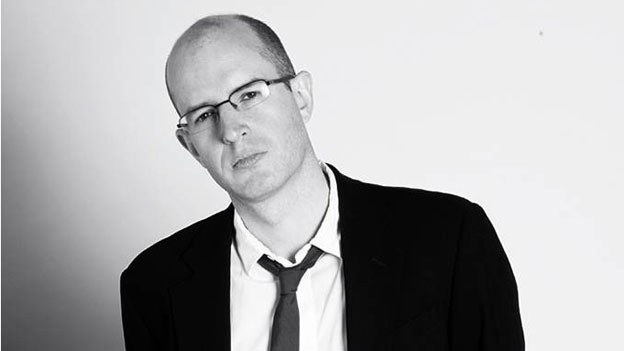
Duncan is the former lifestyle editor of T3 and has been writing about tech for almost 15 years. He has covered everything from smartphones to headphones, TV to AC and air fryers to the movies of James Bond and obscure anime. His current brief is everything to do with the home and kitchen, which is good because he is an excellent cook, if he says so himself. He also covers cycling and ebikes – like over-using italics, this is another passion of his. In his long and varied lifestyle-tech career he is one of the few people to have been a fitness editor despite being unfit and a cars editor for not one but two websites, despite being unable to drive. He also has about 400 vacuum cleaners, and is possibly the UK's leading expert on cordless vacuum cleaners, despite being decidedly messy. A cricket fan for over 30 years, he also recently become T3's cricket editor, writing about how to stream obscure T20 tournaments, and turning out some typically no-nonsense opinions on the world's top teams and players.
Before T3, Duncan was a music and film reviewer, worked for a magazine about gambling that employed a surprisingly large number of convicted criminals, and then a magazine called Bizarre that was essentially like a cross between Reddit and DeviantArt, before the invention of the internet. There was also a lengthy period where he essentially wrote all of T3 magazine every month for about 3 years.
A broadcaster, raconteur and public speaker, Duncan used to be on telly loads, but an unfortunate incident put a stop to that, so he now largely contents himself with telling people, "I used to be on the TV, you know."
